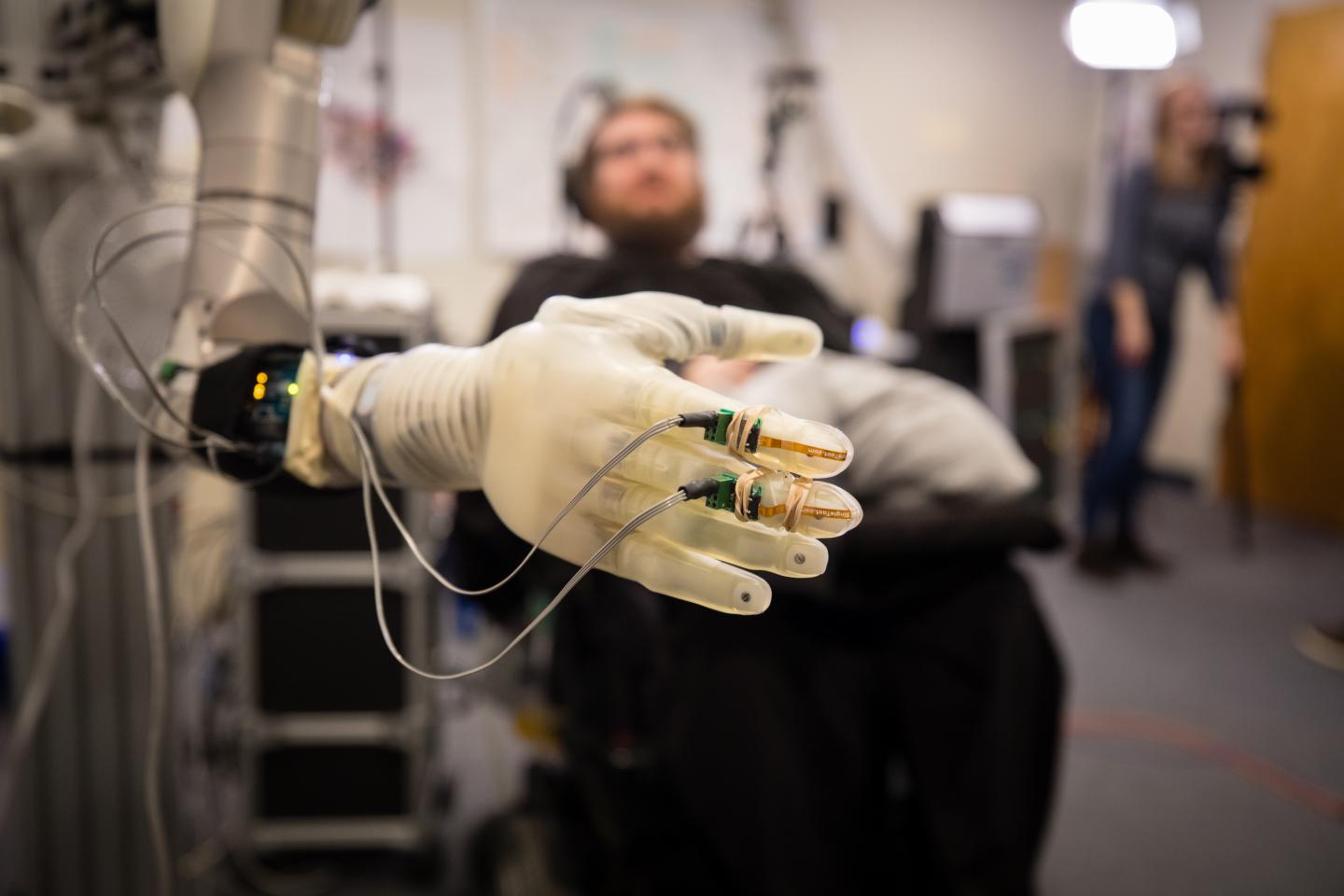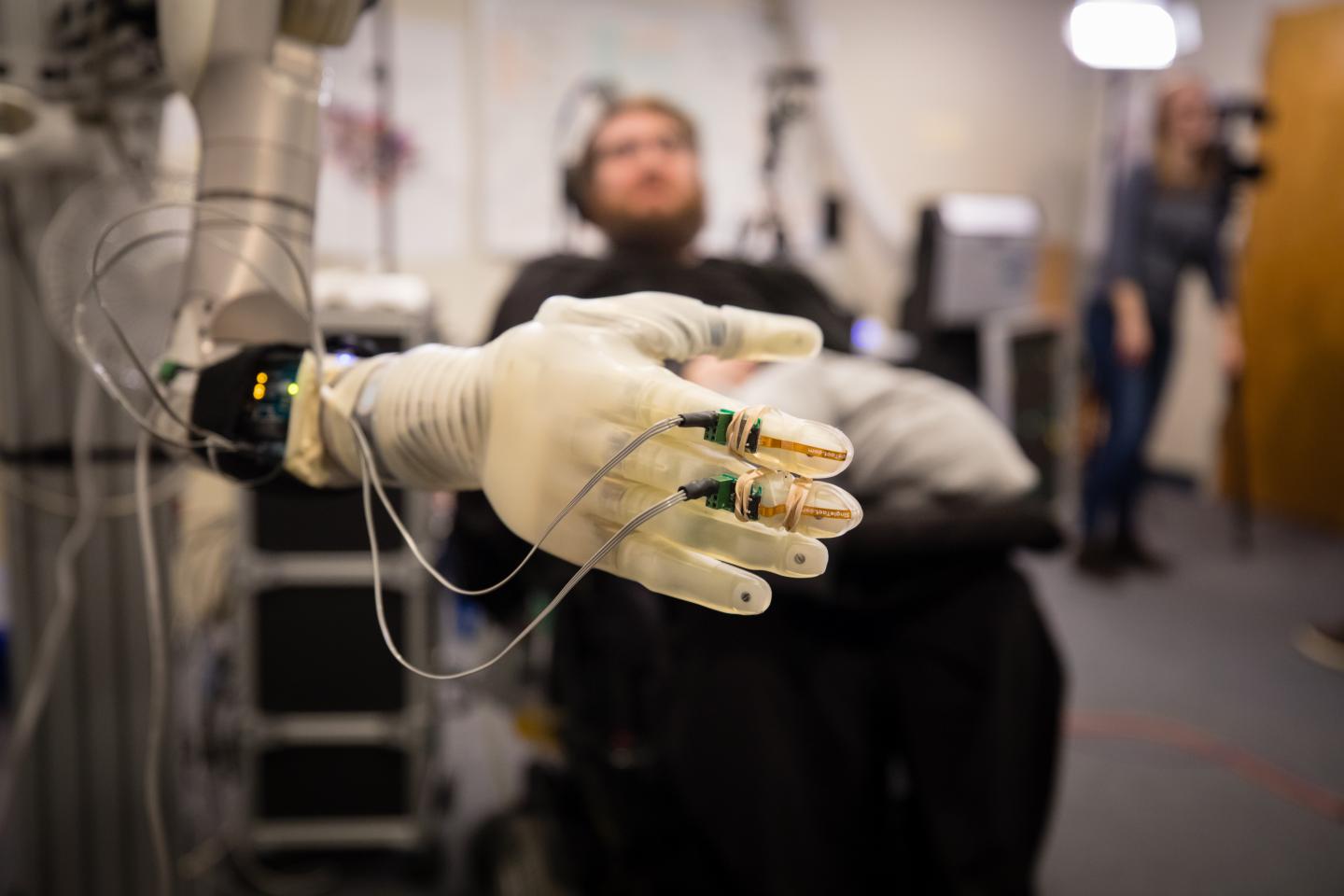
Credit: Tim Betler, UPMC
A team of University of Pittsburgh and UPMC researchers was recently awarded two grants from the National Institutes of Health (NIH) totaling over $8 million to expand their groundbreaking brain computer interface (BCI) research in collaboration with researchers at the University of Chicago and Carnegie Mellon University.
The BCI team at Pitt and UPMC, composed of Jennifer Collinger, Ph.D., Michael Boninger, M.D., Robert Gaunt, Ph.D., and Elizabeth Tyler-Kabara, M.D., Ph.D., has worked with two Pittsburgh-area clinical trial participants since 2012, both of whom had paralysis of their arms and hands, to allow them to control a robotic arm with their minds. One of them even regained his sense of touch through the robotic arm. The new funding will support critical next steps in their research.
The first grant, led by Boninger, provides $7 million in NIH funding to expand Pitt and UPMC's BCI trial to a second site at the University of Chicago, where the researchers will collaborate with a team led by Sliman Bensmaia, Ph.D., and Nicholas Hatsopoulos, Ph.D., with the goal of restoring hand function via a robotic arm.
The Pittsburgh and Chicago teams will each enroll two additional research participants over the next five years, allowing them to replicate the promising work done already in Pittsburgh and increasing their research capacity with the goal of uniting the sensory and motor systems so they can work together for improved and more functional control of the robotic arm.
"Expanding our BCI research is a critical part in the translational process of bringing research to the people who need it most," said Boninger, the UPMC Endowed Vice Chair for Research in the Department of Physical Medicine & Rehabilitation at Pitt. "Together with our collaborators at the University of Chicago, we hope to reach our eventual goal of making this technology functional for everyday use."
The second grant, led by Collinger, provides $1.2 million in NIH funding for the research team over the next two years to study how the environment and the context of a task impacts motor plans and sensory perception. The grant is part of the federal BRAIN Initiative, a large-scale effort announced in 2013 aimed at gaining a deeper understanding of the brain and applying the knowledge to prevent and treat brain disorders.
Additional collaborators on the grant include Steven Chase, Ph.D., and Byron Yu, Ph.D., of Carnegie Mellon University's College of Engineering; and Aaron Batista, Ph.D., and Patrick Loughlin, Ph.D., of Pitt's Swanson School of Engineering.
"When someone is controlling a robotic arm using a BCI, we get a very strong signal that tells us how they are planning to move that arm, but that signal is drastically impacted by changes in the environment around them," said Collinger, assistant professor in the Department of Physical Medicine and Rehabilitation at Pitt. "For example, the way we move our arm to grasp is likely very different if we are reaching for a full glass of water, an empty glass, a hot cup of coffee or a plastic water bottle. Uniting our expertise with new collaborators at Pitt and CMU will allow us to gain a better understanding of how and why the brain functions in this way when generating motor plans or perceiving sensory information."
###
This research will be funded by NIH grants U01NS108922 and UH3NS107714.
About the University of Pittsburgh Schools of the Health Sciences
The University of Pittsburgh Schools of the Health Sciences include the schools of Medicine, Nursing, Dental Medicine, Pharmacy, Health and Rehabilitation Sciences and the Graduate School of Public Health. The schools serve as the academic partner to the UPMC (University of Pittsburgh Medical Center). Together, their combined mission is to train tomorrow's health care specialists and biomedical scientists, engage in groundbreaking research that will advance understanding of the causes and treatments of disease and participate in the delivery of outstanding patient care. Since 1998, Pitt and its affiliated university faculty have ranked among the top 10 educational institutions in grant support from the National Institutes of Health. For additional information about the Schools of the Health Sciences, please visit http://www.health.pitt.edu.
About UPMC
A $19 billion world-renowned health care provider and insurer, Pittsburgh-based UPMC is inventing new models of patient-centered, cost-effective, accountable care. UPMC provides more than $900 million a year in benefits to its communities, including more care to the region's most vulnerable citizens than any other health care institution. The largest nongovernmental employer in Pennsylvania, UPMC integrates 85,000 employees, 40 hospitals, 600 doctors' offices and outpatient sites, and a 3.4 million-member Insurance Services Division, the largest medical insurer in western Pennsylvania. As UPMC works in close collaboration with the University of Pittsburgh Schools of the Health Sciences, U.S. News & World Report consistently ranks UPMC Presbyterian Shadyside on its annual Honor Roll of America's Best Hospitals. UPMC Enterprises functions as the innovation and commercialization arm of UPMC, and UPMC International provides hands-on health care and management services with partners around the world. For more information, go to UPMC.com.
http://www.upmc.com/media
Media Contact
Arvind Suresh
[email protected]
412-647-9966
@UPMCnews
http://www.upmc.com/Pages/default.aspx





